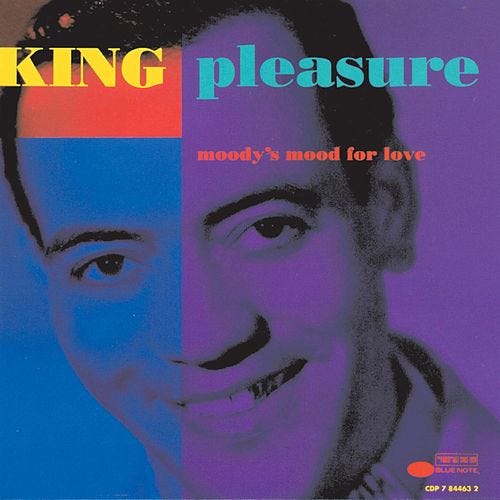King Pleasure — Moody’s Mood For Love
24.June.2020
King Pleasure
Moody’s Mood For Love
1992
Born Clarence Beeks in Oakdale, Tennesse, he found success as a jazz musician under the name of King Pleasure.
King Pleasures instrument was his voice.
He sang using a type of singing referred to as “vocalese” — singing in which words are added to a soloist’s improvisation.
Where jazz singers like Ella Fitzgerald employed a “scat” method, which uses nonsense words such as “bap ba dee dot bwee dee” in solos, “vocalese” singers like Pleasure uses lyrics set to pre-existing instrumental solos.
The words to “Moody’s Mood for Love” were written and first sung by vocalese pioneer Eddie Jefferson. The lyrics matched the be-bop stylings of Jazz saxophone player James Moody’s 1949 solo in “I’m in the Mood for Love.” However, it’s Pleasure’s 1952, his first after signing to Prestige Records, that is considered the classic.
The list of artists who have covered the song include:
Aretha Franklin on the 1973 album Hey Now Hey (The Other Side of the Sky)
George Benson on the 1980 album Give Me the Night
Quincy Jones on the 1995 album Q’s Jook Joint
Amy Winehouse on the 2003 album Frank
Queen Latifah on the 2004 album The Dana Owens Album
Patti Labelle on the 2017 album Bel Hommage
The King Pleasure sound influenced vocalists like Al Jarreau and the Manhattan Transfer.
You can also hear it in rock and roll. In particular, Van Morrison’s Astral Weeks (Morrison covered “Moody’s Mood for Love” on his 1993 album Too Long in Exile), and Joe Jackson’s Jumpin’ Jive. Other artists who released renditions of the song include Tito Puente, Kermit Ruffins, and The Guess Who.
In a recent interview with The New York Times, Bob Dylan recently acknowledged that it was King Pleasure who epitomized jazz singer:
“King Pleasure, that’s my idea of a jazz singer.”
King Pleasure’s career was short. While he was still recording in the early ‘60’s he faded into obscurity shortly afterward. Very little is known about that period.
Sadly, King Pleasure didn’t get to see or experience any of his influence.
King Pleasure, Clarence Beeks, died three days short of his 60th birthday in 1982.
This King Pleasure album Moody’s Mood For Love was first compiled and released in 1972 but then re-issued by Blue Note Records in 1992.




